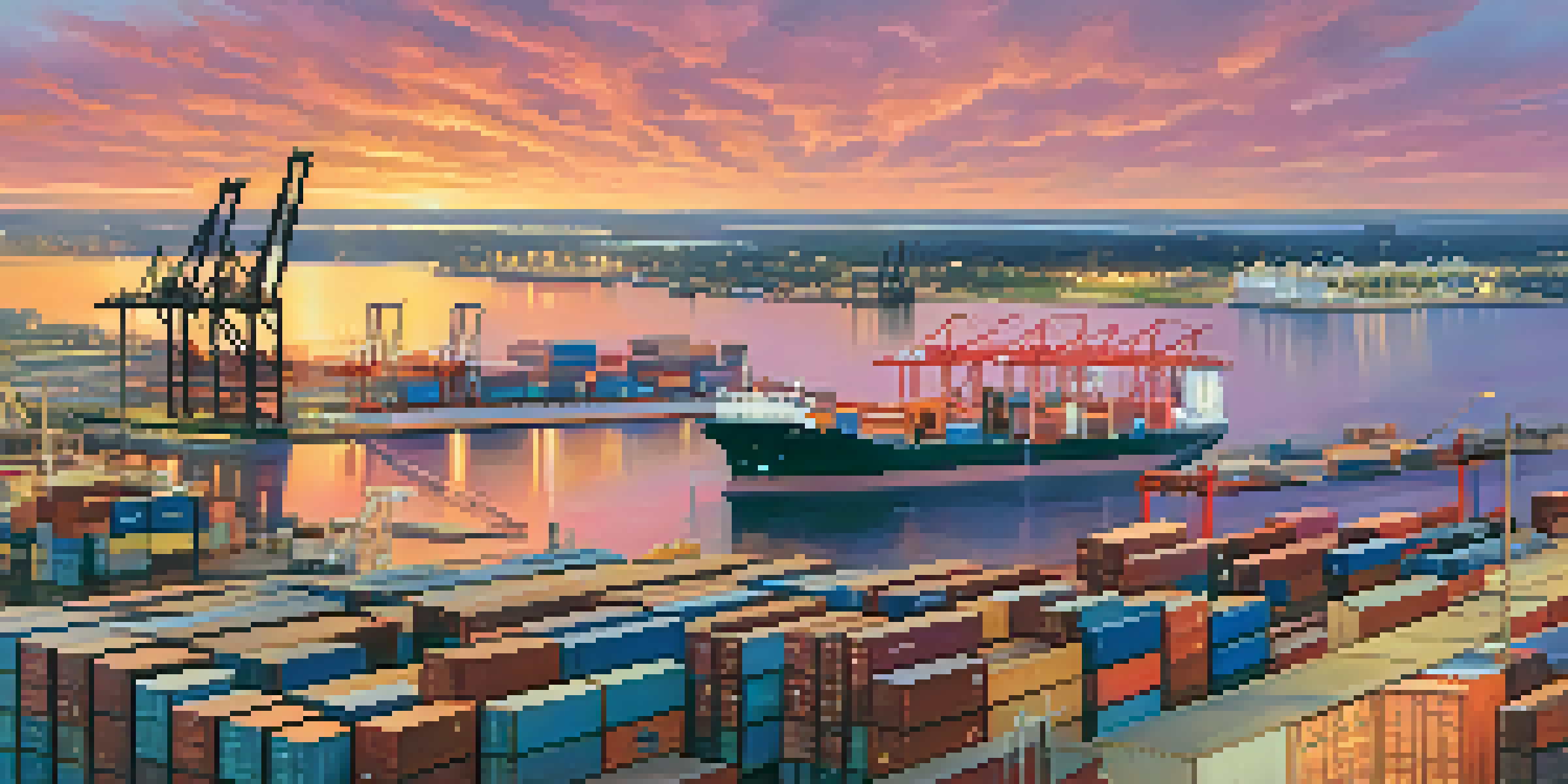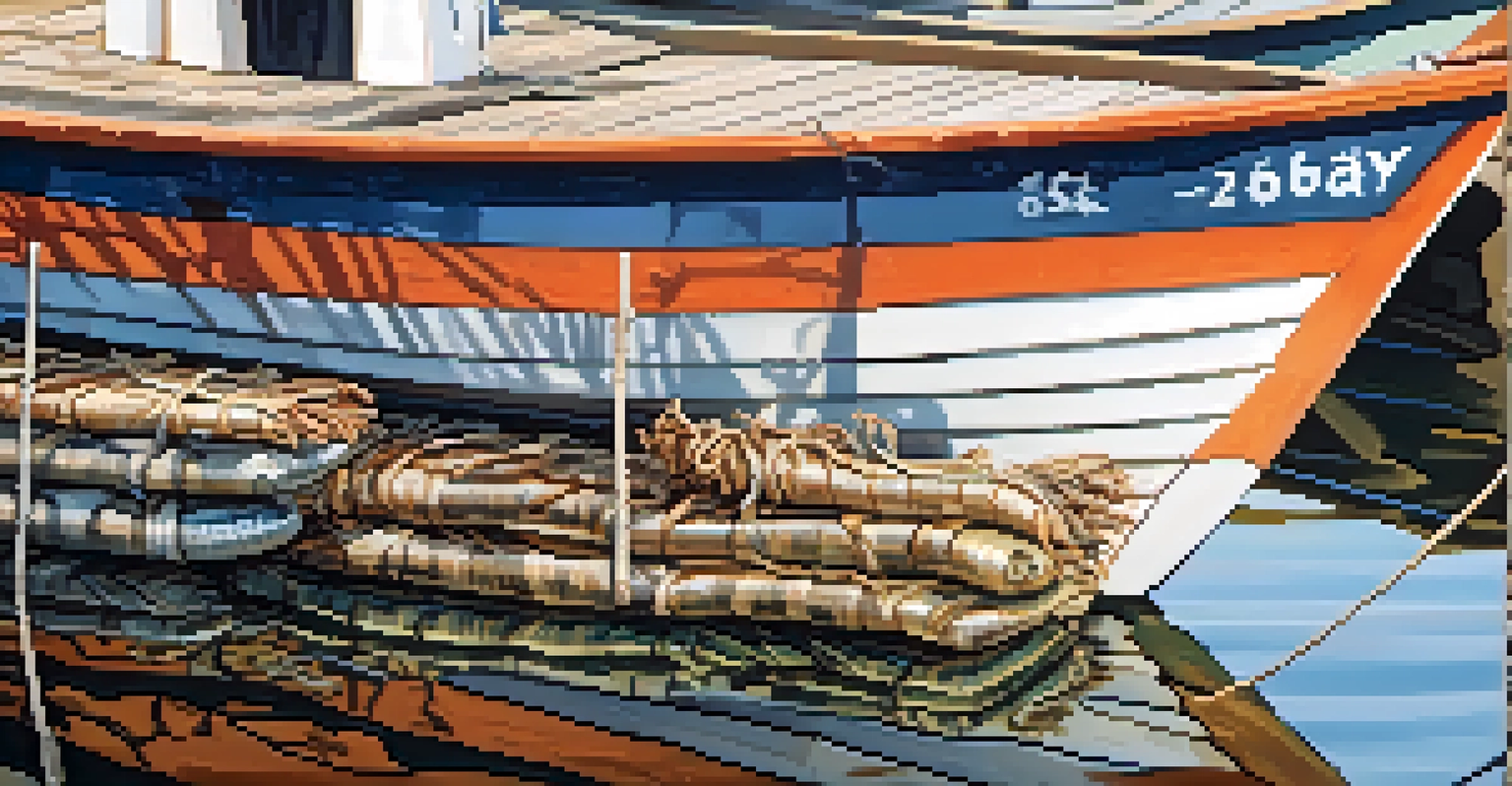Jacksonville's Maritime History and Its Economic Impact

The Origins of Jacksonville's Maritime Significance
Jacksonville's maritime history dates back to its founding in the early 19th century. The city's strategic location along the St. Johns River made it a prime spot for trade and transportation. This natural harbor attracted settlers and traders, establishing Jacksonville as a bustling port.
A port is not just a collection of docks and warehouses; it is a gateway to the world, a lifeline for trade and commerce.
As the city grew, so did its maritime activities, including shipbuilding and fishing. The rich waters of the Atlantic Coast provided abundant resources, leading to the development of a robust fishing industry. Consequently, Jacksonville became known for its seafood, drawing both locals and visitors alike.
This early maritime significance laid the groundwork for Jacksonville's economic development. The port's capacity to handle cargo and support trade routes ensured that the city would thrive and evolve into a central hub of commerce in Florida.
The Rise of Shipbuilding in Jacksonville
During the late 19th and early 20th centuries, Jacksonville emerged as a significant shipbuilding center. With access to the necessary timber and skilled labor, local shipyards flourished, producing vessels for both commercial and military use. This boom in shipbuilding not only provided jobs but also established Jacksonville's reputation as a maritime powerhouse.

The city's shipyards played a crucial role during World War II, contributing to the war effort by constructing naval ships. The influx of workers and resources during this period further solidified Jacksonville’s economic importance. The legacy of these shipyards can still be seen today, as many have transitioned into modern maritime industries.
Jacksonville's Historic Maritime Roots
The city's strategic location along the St. Johns River established it as a bustling port, fostering trade and a vibrant seafood industry.
Moreover, the shipbuilding industry had a ripple effect on the local economy. It stimulated growth in related sectors, such as steel production and machinery, creating a diverse economic landscape that still benefits the region.
The Impact of the Port on Jacksonville's Economy
The Jacksonville Port Authority oversees one of the largest ports in the Southeastern United States. This port serves as a critical gateway for international trade, significantly impacting the local economy. The port's facilities handle various cargo types, including containers, bulk goods, and automobiles.
Maritime heritage is not just about the past; it shapes our identity and influences our future.
As trade volumes have increased, so has the port's economic influence. The port generates thousands of jobs, not only within its confines but also in sectors like logistics, warehousing, and transportation. This interconnectedness underscores the port's role as a vital economic engine for the city.
Furthermore, the port's ongoing expansion and modernization efforts reflect Jacksonville's commitment to remaining competitive in the global market. By investing in infrastructure and technology, the city aims to attract more businesses and boost its economic growth.
Cultural Influences from Jacksonville's Maritime Past
Jacksonville's maritime history has greatly influenced its cultural landscape. The city's waterfront has inspired numerous festivals, events, and traditions that celebrate its nautical heritage. From seafood festivals to boat parades, these events foster community spirit and pride.
Additionally, the city's museums and historical sites highlight its rich maritime past. The Jacksonville Maritime Museum, for example, showcases artifacts and stories that reflect the city's deep connection to the sea. This cultural appreciation not only attracts tourists but also educates residents about their maritime legacy.
Economic Growth from the Port
The Jacksonville Port Authority significantly impacts the local economy by generating thousands of jobs and supporting various related sectors.
The blend of cultures brought by maritime trade has also shaped Jacksonville’s culinary scene. Fresh seafood dishes and local recipes celebrate the port's influence, making the city's gastronomy a unique reflection of its maritime roots.
Recreational Opportunities Linked to Maritime Activities
Jacksonville’s maritime history has also provided residents with abundant recreational opportunities. The city boasts picturesque beaches and waterways that invite both locals and tourists to engage in water-based activities. From fishing and boating to kayaking and paddleboarding, the options are seemingly endless.
The St. Johns River, in particular, offers a scenic backdrop for outdoor adventures. Parks and trails along the river enhance the recreational experience, making it a popular spot for picnics, jogging, and family outings. This connection to the water fosters a sense of community and encourages an active lifestyle.
Moreover, these recreational activities contribute to the local economy by attracting visitors. Tourism related to water sports and outdoor events helps sustain businesses, from restaurants to rental shops, reinforcing the importance of Jacksonville's maritime heritage in everyday life.
Modern Maritime Innovations in Jacksonville
Today, Jacksonville continues to innovate within the maritime sector. Advances in technology and sustainability practices are shaping the future of the local industry. For instance, the implementation of eco-friendly shipping practices is becoming increasingly important for businesses operating in the port.
The city is also nurturing the growth of maritime-related startups, which are leveraging technology to enhance efficiency and reduce environmental impacts. This focus on innovation not only positions Jacksonville as a leader in maritime advancements but also attracts investment and talent to the region.
Modern Challenges for Maritime Sector
Environmental concerns, competition from other ports, and the need for skilled workers present ongoing challenges for Jacksonville's maritime industry.
By embracing these modern trends, Jacksonville is ensuring that its maritime industry remains relevant and competitive in a rapidly changing world. This commitment to progress will ultimately benefit the local economy and preserve the city's maritime legacy for future generations.
Challenges Facing Jacksonville's Maritime Industry
Despite its rich maritime heritage, Jacksonville's maritime industry faces several challenges. Environmental concerns, such as pollution and climate change, pose a significant threat to the health of local waterways. Addressing these issues is critical for maintaining the port's operational viability and protecting the surrounding ecosystems.
Additionally, competition from other ports is increasing as global trade dynamics evolve. Jacksonville must continually adapt to remain attractive to shipping companies and international businesses. This requires ongoing investment in infrastructure and technology to enhance efficiency and capacity.

Lastly, workforce development is crucial for the industry's future. As technology advances, there is a growing need for skilled workers who can navigate the complexities of modern maritime operations. Collaborative efforts between educational institutions and businesses will be essential to prepare the next generation of maritime professionals.